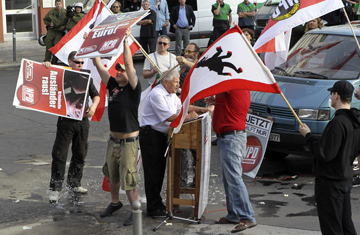
A water balloon explodes next to Udo Voigt (center), leader of the far-right National Democratic party (NPD) as he gives a speech to supporters during a rally in Berlin, June 17, 2011
Two weeks after Anders Breivik's killing spree, Germany's Federal Interior Ministry said it will take part in a new working group, along with representatives of Germany's state governments, weighing a ban on the country's most influential far-right political party, the National Democratic Party, or NPD. The extreme right group, which advocates a crackdown on immigrants is a legal political party and benefits from state funding. A recent poll found that almost 70% of Germans support outlawing the controversial group and the Interior Ministry reports that 11 out of 16 states were willing to discuss it. Opposition politicians, it seems, are also on board. "I'm pleased that other states have come out in favor of an NPD ban which we initiated in the city of Hamburg," said Michael Neumann, Hamburg's Interior Minister. Sigmar Gabriel of the SPD opposition told Bild am Sonntag that he backed the ban because the NPD's "rabble-rousing" should not be supported by taxpayers' money.
Still, the ban is a long shot. Chancellor Merkel's government is cautious, wary that the process may be mired in complications or could play into the NPD's hands. According to a statement released on Friday, the government "still subscribes to the view that has been held for the past few years that another bid to ban the NPD ... would involve a high risk of another failure." In the past, they've said a ban would not be feasible because the government and security agencies would have to withdraw their undercover agents from the Far-Right Party.
Previous attempts to curb the 6,600-strong NPD party have failed. In 2001, Chancellor Gerhard Schröder's government tried to outlaw the NPD, arguing that the party's far-right ideology breached Germany's constitution. But Germany's highest court threw out the case in 2003, after it emerged that the government had for years relied on evidence provided by paid informants in the far-right scene. "Germany's political class is in broad agreement that the NPD is neither constitutional nor democratic and should be outlawed. Yet it fears a similar debacle to 2003 when the NPD ban failed," says Jörg Forbrig, an analyst at the German Marshall Fund in Berlin. "Behind those concerns may be an acknowledgment that close surveillance and infiltration of the party by security services — the reason why the constitutional court dismissed the ban in 2003 — has continued right up till today."
The Constitutional Court's ruling in 2003 was an embarrassing blow to Schröder's government and provided a significant boost for the morale of the NPD, which went on to make big gains in regional elections. The NPD is represented in two state parliaments but it doesn't have any seats in the German federal parliament, or Bundestag. Still, it is the biggest far-right party in Germany in terms of its members and influence. While some experts argue that banning far-right political parties could prove counter-productive, driving members underground and radicalizing them further, others claim they shouldn't get a financial lifeline from taxpayers. "The NPD is dangerous — its far-right, violent and xenophobic ideology threatens the multi-ethnic fabric of German society," says Hajo Funke of the Free University of Berlin. Funke says Germany is still home to "an active, dangerous and strong Neo-Nazi movement" with far-right grassroots groups that are bent on violence.
The NPD dismissed plans for a ban as "absurd." "We aren't engaged in any forbidden activities so we can't be banned," Klaus Beier, the NPD's federal spokesman, told TIME. In other words, they plan to stick around.
